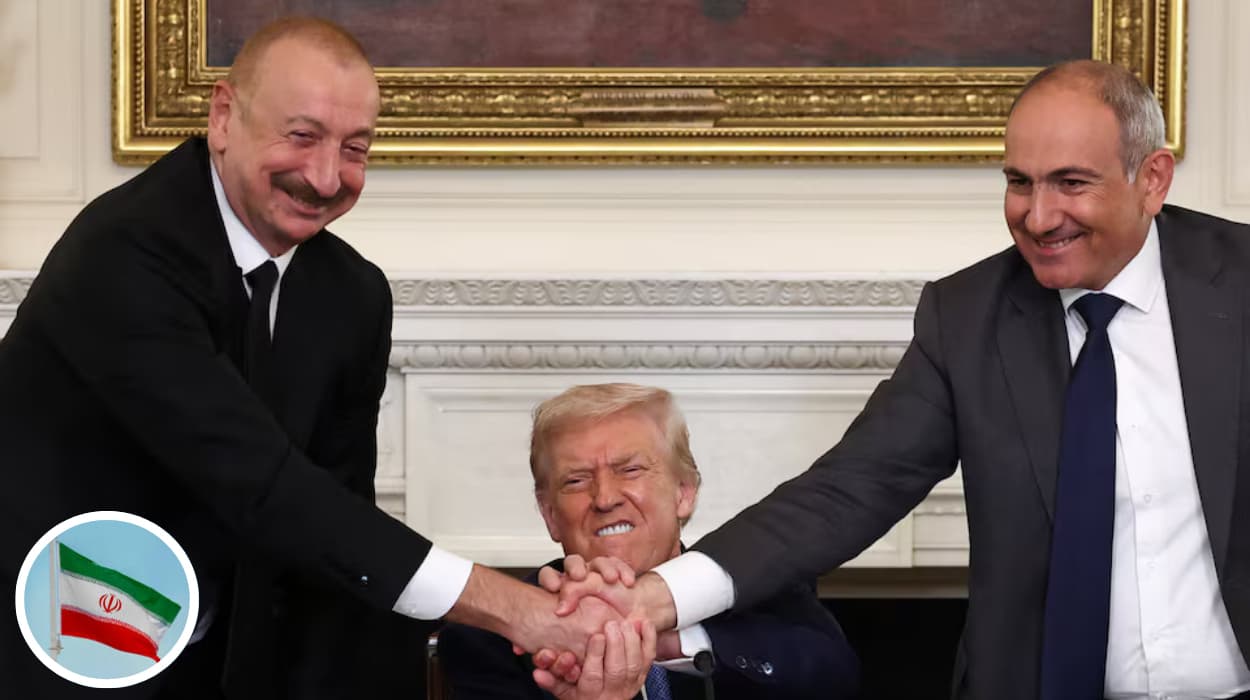Summary
- The U.S.-brokered Armenia-Azerbaijan peace deal includes a transit corridor linking Azerbaijan with its exclave through Armenia.
- The corridor is known as the "Trump Route for International Peace and Prosperity" with U.S. development rights.
- Iran strongly opposes the corridor, citing threats to regional stability and national security.
- Senior Iranian officials vow to block the corridor, calling it an “impossible notion.”
- Iran supports the overall peace deal but warns against foreign interference near its borders.
- The deal was signed at the White House by Armenia’s and Azerbaijan’s leaders, facilitated by President Trump.
- The corridor risks disrupting regional transport initiatives and geopolitical balances.
- Questions remain about the corridor’s administration, legal framework, and operational details.
This landmark peace agreement, while heralded as a significant step towards resolving a long-standing conflict, has sparked serious concerns from Iran, which views the proposed transit corridor as a destabilizing factor that could upset the delicate balance of power in the South Caucasus. As the U.S. asserts a new strategic role through exclusive development rights over the corridor, Tehran’s vocal opposition and readiness to act independently highlight the complex interplay of regional interests that could complicate the corridor’s implementation and the broader pursuit of lasting peace in the area.
What Is the Trump-Brokered Armenia-Azerbaijan Peace Deal?
As reported by Parisa Hafezi and Andrew Osborn of Reuters, on August 8, 2025, Armenian Prime Minister Nikol Pashinyan and Azerbaijani President Ilham Aliyev signed a landmark peace agreement at the White House, brokered by U.S. President Donald Trump. The deal aims to end decades of conflict between the two nations over the Nagorno-Karabakh region and establish conditions for lasting peace, including opening diplomatic ties and enhancing economic cooperation. Central to the agreement is the creation of a transit corridor running through southern Armenia to connect Azerbaijan’s mainland with its exclave of Nakhchivan. This corridor, officially called the "Trump Route for International Peace and Prosperity," grants the United States exclusive development rights, marking a major U.S. role in regional affairs.
Why Does Iran Oppose the Trump Corridor?
According to multiple reports including from Tasnim News Agency and Channel News Asia, Iran has expressed strong opposition to the transit corridor, warning it will threaten the security and stability of the South Caucasus region. Ali Akbar Velayati, senior adviser on international affairs to Iran's Supreme Leader Ayatollah Ali Khamenei, called the corridor proposal "an impossible notion" and affirmed Iran's intention to block it "with or without Russia." Velayati characterized the corridor as a plot that could turn the area into "a graveyard for Trump’s mercenaries," underscoring Tehran’s readiness to defend its interests powerfully, including through military exercises near the border.
Iran fears the corridor, also known as the Zangezur corridor, would sever its overland connection to Armenia and the wider Caucasus region and bring a foreign military and commercial presence close to its borders. Iranian officials argue that such foreign intervention, especially near shared borders, risks undermining regional security and could lead to the disintegration of Armenian sovereignty in the affected area.
How Has Iran Officially Responded to the Peace Deal?
While Iran has welcomed the finalization of the peace agreement as a significant step toward regional stability, its foreign ministry issued cautious statements warning against any foreign interference that could disrupt lasting peace. Spokespersons emphasized that transport corridors and connectivity infrastructure contribute positively only when aligned with mutual interests and respect for sovereignty without foreign involvement. Iran's foreign ministry reiterated its commitment to cooperate constructively with both Armenia and Azerbaijan on peace, security, and economic development through bilateral and regional formats such as the 3+3 mechanism, which includes Russia, Turkey, Azerbaijan, Armenia, Iran, and Georgia.
What Are the Geopolitical Implications?
Experts note that the corridor represents a major shift in regional power dynamics. As analyzed by Newsweek, the corridor challenges Russian and Iranian influence in the South Caucasus, as the U.S. gains a foothold via exclusive developmental rights. Azerbaijan, which has strengthened ties with Turkey, views the corridor as strategically vital to connect its exclave to the mainland and expand access to European markets, especially for its energy exports. Meanwhile, Armenia grapples with internal political risks concerning constitutional compatibility and the sovereignty issues linked to the corridor's administration.
Iran and Russia are expected to view this corridor with suspicion, as it may disrupt prior regional transportation initiatives like the International North-South Transport Corridor, potentially undermining Moscow and Tehran's strategic interests. The corridor shows the broader geopolitical contest between U.S., Russian, and Iranian influence in the Caucasus region.
What Challenges Remain for the Peace Deal and Corridor?
Despite the historic nature of the deal, numerous operational details remain unclear. Azerbaijani diplomats noted that the timeline for the corridor's development depends on ongoing U.S.-Armenian collaboration. Issues such as customs management, security arrangements, and the legal governance of the corridor upheld under Armenian law raise questions and concerns from Azerbaijan. The lack of details on reciprocal arrangements and security oversight presents hurdles to the corridor's smooth implementation and sustainability.
How Are the Leaders of Armenia, Azerbaijan, and the U.S. Framing the Deal?
President Trump hailed the agreement as a breakthrough, declaring it ended a "35-year war" and optimistic that Armenia and Azerbaijan "are going to be friends a long time." Aliyev called the deal "a miracle," and Pashinyan termed it a "significant milestone." A White House official described the United States as an "enormous strategic commercial partner" for the region, signaling U.S. ambitions to establish lasting influence through this corridor project. However, critics and analysts note that the deal also alienates key regional powers like Russia, China, and Iran.
The U.S.-brokered Armenia-Azerbaijan peace deal is a watershed moment, ending decades of conflict and promising economic integration and stability in the South Caucasus. Nonetheless, Iran's vigorous opposition and willingness to militarily resist the "Trump corridor" indicate ongoing risks of regional instability. The corridor's precise implementation and geopolitical fallout remain to be seen, with cautious diplomacy and comprehensive legal frameworks needed to sustain peace in this volatile region.

